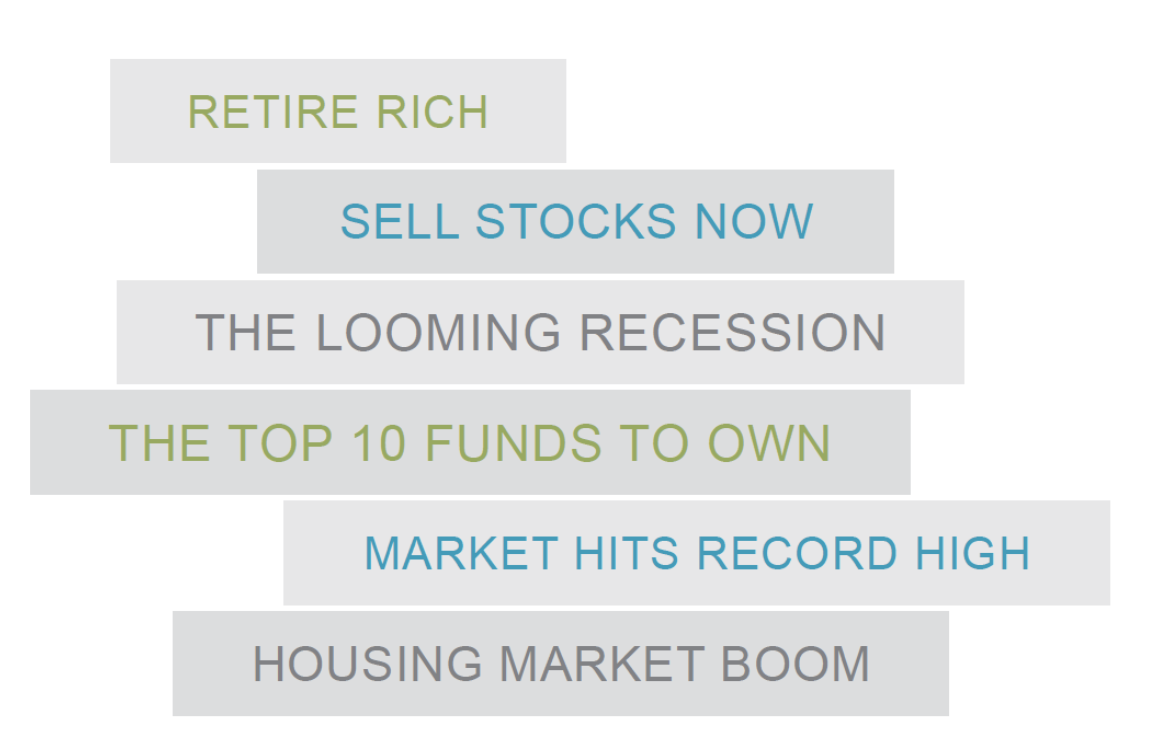A Better Investment Experience: 10 Key Tips. By Murray Coleman.
When trying to outperform an index, many investors will try to trade between funds focused on different market segments and asset classes. But such an active investment approach isn't without costs. In fact, market timing can increase return volatility and add unnecessary uncertainty to the overall experience of investing in stocks and bonds. (See "Market Timing: More Evidence Why It Doesn't Work.")
Along these lines, IFA's wealth advisors like to point investors to work by researchers at our preferred funds provider, Dimensional Fund Advisors. Besides considering the ill-effects of market timing, they've looked at issues relating to behavioral finance and the science of risk management.
In applying their findings at the portfolio level, Dimensional's researchers have identified several overarching principles that can be key to investors in pursuit of a better investment experience — i.e., maximizing a portfolio's performance over time given each person's unique risk capacity.
Below are 10 short tips — each with an informational graphic below the text — summarizing key research findings they've uncovered to help investors take advantage of a more reliable investment approach for capturing what the market has to offer.
1: Embrace Market Pricing
The market is an effective information-processing machine. Each day, the world equity markets process billions of dollars in trades between buyers and sellers —and the real-time information they bring helps set prices.
2: Don't Try to Outguess the Market
The market's pricing power works against mutual fund managers who try to outperform through stock picking or market timing. As evidence, only 17% of U.S. equity mutual funds and 14% of fixed-income funds have survived and outperformed their benchmarks over the past 20 years (through 2022).
3: Resist Chasing Past Performance
Some investors select mutual funds primarily based on historical returns. Yet, past performance offers little insight into a fund's future returns. For example, most funds in the top quartile (25%) of previous five-year returns did not maintain a top‐quartile ranking in the following five years.
4: Let Markets Work for You
The financial markets have rewarded long-term investors. People expect a positive return on the capital they supply, and historically, the equity and bond markets have provided growth of wealth that has more than offset inflation.
5: Consider the Drivers of Returns
There is a wealth of academic research into what drives returns. Expected returns depend on current market prices and expected future cash flows. Investors can use this information to pursue higher expected returns in their portfolios. Equity funds used in IFA Index Portfolios tilt to prominent factors such as size, value (relative price) and profitability. In fixed-income, our portfolios implement mutual funds and ETFs that screen bonds by characteristics relating to term-length, credit quality and measures of currency exposure.
6: Practice Smart Diversification
Holding securities across many market segments can help manage overall risk. But diversifying within your home market might not be enough. Global diversification can broaden your investment universe by lowering your IFA Index Portfolio's overall risk exposure.
7: Avoid Market Timing
You never know which market segments will outperform from one year to the next. By holding a globally diversified portfolio, investors are well-positioned to seek returns whenever — and wherever — such gains take place.
8: Manage Your Emotions
Many people struggle to separate their emotions from investing. Studies in behavioral finance, however, inform us that markets go up and down. Reacting to current market conditions in the heat of the moment, so to speak, can lead to making poor investment decisions.
9: Look Beyond the Headlines
Daily market news and commentary can challenge your investment discipline. Some messages stir anxiety about the future, while others tempt you to chase the latest investment fad. When headlines seem rather unsettling, IFA's wealth advisors urge you to consider the source and maintain a long‑term perspective.
10: Focus on What You Can Control
An IFA wealth advisor stands to offer another set of experienced and objective eyes to help you focus on actions that really can add value. This can lead to a better investment experience and increase the odds of reaching your holistic financial goals. Specifically, our advisors can support you in the following ways:
Create an investment plan to fit your needs and unique risk capacity.
Design a portfolio of index funds along the key dimensions identified by leading academic researchers as driving expected returns in stocks and bonds.
Make sure an IFA Index Portfolio is properly diversified across global markets to increase expected returns while decreasing overal portfolio risk.
Manage expenses, portfolio turnover and help to minimize tax liabilities.
Stay disciplined through market dips and swings.
The famous quote from Maimonides tells us, "Give a man a fish and you feed him for a day; teach a man to fish and you feed him for a lifetime."
Likewise, educating investors on how to invest versus simply telling them what to do is our answer to solving such a problem in adapting the financial sciences to building wealth.
Outlining these 10 basic steps is another educational resource that we hope investors will use to help connect the dots of IFA's investment process and their efforts to achieve long-term financial success.
The exhibits on this page wererepublished here with permission of Dimensional Fund Advisors LP. No further republication or redistribution is permitted without the consent of Dimensional Fund Advisors LP.









